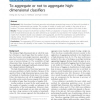Free Online Productivity Tools
i2Speak
i2Symbol
i2OCR
iTex2Img
iWeb2Print
iWeb2Shot
i2Type
iPdf2Split
iPdf2Merge
i2Bopomofo
i2Arabic
i2Style
i2Image
i2PDF
iLatex2Rtf
Sci2ools
171
click to vote
BMCBI
2011
2011
To aggregate or not to aggregate high-dimensional classifiers
Background: High-throughput functional genomics technologies generate large amount of data with hundreds or thousands of measurements per sample. The number of sample is usually much smaller in the order of ten or hundred. This poses statistical challenges and calls for appropriate solutions for the analysis of this kind of data. Results: Principal component discriminant analysis (PCDA), an adaptation of classical linear discriminant analysis (LDA) for high-dimensional data, has been selected as an example of a base learner. The multiple versions of PCDA models from repeated double cross-validation were aggregated, and the final classification was performed by majority voting. The performance of this approach was evaluated by simulation, genomics, proteomics and metabolomics data sets. Conclusions: The aggregating PCDA learner can improve the prediction performance, provide more stable result, and help to know the variability of the models. The disadvantage and limitations of aggregat...
Biometrics | BMCBI 2011 | Cross Validation | Linear Discriminant Analysis | Statistical Challenges |
Related Content
| Added | 24 Aug 2011 |
| Updated | 24 Aug 2011 |
| Type | Journal |
| Year | 2011 |
| Where | BMCBI |
| Authors | Cheng-Jian Xu, Huub C. J. Hoefsloot, Age K. Smilde |
Comments (0)

